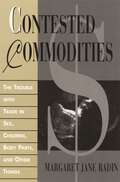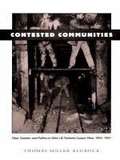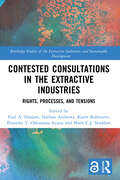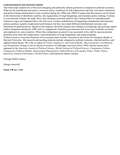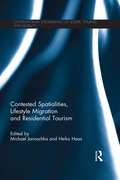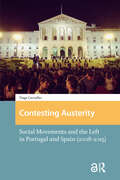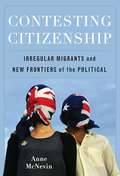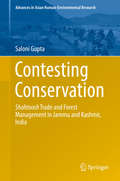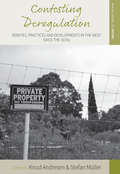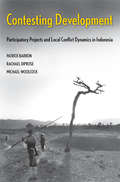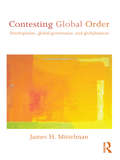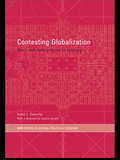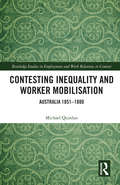- Table View
- List View
Contested Civil Society in Myanmar: Local Change and Global Recognition
by Maaike MatelskiAvailable open access digitally under CC-BY-NC-ND licence. This book centres on various contestations in Myanmar society and illustrates the ways in which these are reflected in civil society. The book offers a concise overview of recent political developments in the country, from the short-lived attempts at democratization to the 2021 military coup, and analyses the involvement of various civil society actors, as well as their international supporters. It incorporates multiple identities and fault lines in Myanmar society and explains how these influence diverse perceptions, framing and agenda setting as political developments unfold. The book provides an up-to-date overview of the main identities and contestations within Myanmar’s civil society and, by extension, within Myanmar society as a whole. It also gives recommendations to donors, policy makers and researchers wishing to better understand and support local civil society actors operating in repressive environments.
Contested Coastlines: Fisherfolk, Nations and Borders in South Asia
by Charu Gupta Mukul SharmaThis book is about the tragic journeys and livelihood insecurities of coastal fisherfolk jailed by India, Pakistan, Sri Lanka and Bangladesh for having entered each other’s territorial waters. While reflecting on national anxieties and the deleterious politics of boundaries, it reveals how these fisherfolk create alternative maps and a new world of ‘debordering’. These fishworkers and coastal conflicts have been subjects of everyday news, but never a subject of serious study. A first of its kind, the present book breaks new ground by examining the journeys of these fisherfolk and coastal conflicts in South Asia from several overlapping but distinct perspectives: declining sea resources, security and border anxieties, suffering of the fisherfolk, their ambiguous identities and transnational movements. The book is also innovative in terms of methodology: it is fisherfolk-centric as it marginalizes the concerns of the state from the perspective of security; it questions the very basis of security and argues for a shift in its perspective.
Contested Commodities
by Margaret Jane RadinNot only are there willing buyers for body parts or babies, Radin observes, but some desperately poor people would be willing sellers, while better-off people find such trades abhorrent. Radin observes that many such areas of contested commodification reflect a persistent dilemma in liberal society: we value freedom of choice and simultaneously believe that choices ought to be restricted to protect the integrity of what it means to be a person. She views this tension as primarily the result of underlying social and economic inequality, which need not reflect an irreconcilable conflict in the premises of liberal democracy.As a philosophical pragmatist, the author therefore argues for a conception of incomplete commodification, in which some contested things can be bought and sold, but only under carefully regulated circumstances. Such a regulatory regime both symbolizes the importance of nonmarket value to personhood and aspires to ameliorate the underlying conditions of inequality.
Contested Communities: Class, Gender, and Politics in Chile’s El Teniente Copper Mine, 1904-1951
by Thomas Miller KlubockIn Contested Communities Thomas Miller Klubock analyzes the experiences of the El Teniente copper miners during the first fifty years of the twentieth century. Describing the everyday life and culture of the mining community, its impact on Chilean politics and national events, and the sense of self and identity working-class men and women developed in the foreign-owned enclave, Klubock provides important insights into the cultural and social history of Chile. Klubock shows how a militant working-class community was established through the interplay between capitalist development, state formation, and the ideologies of gender. In describing how the North American copper company attempted to reconfigure and reform the work and social-cultural lives of men and women who migrated to the mine, Klubock demonstrates how struggles between labor and capital took place on a gendered field of power and reconstituted social constructions of masculinity and femininity. As a result, Contested Communities describes more accurately than any previous study the nature of grassroots labor militancy, working-class culture, and everyday politics of gender relations during crucial years of the Chilean Popular Front in the 1930s and 1940s.
Contested Consultations in the Extractive Industries: Rights, Processes, and Tensions (Routledge Studies of the Extractive Industries and Sustainable Development)
by Paul A. HaslamThis volume examines how communities, companies, and governments contest and contribute to the evolution of norms, rules and decision-making procedures that govern stakeholder consultation in the extractive industries. In recent years international organisations, governments and companies around the world have dramatically reformed the regime that governs consultations with community stakeholders about proposed extractive projects. However, the characteristics of this consultation regime are often contested, with diverse stakeholders seeking to defend their interests by drawing on different authoritative interpretations of the rules, norms and decision-making procedures that govern stakeholder consultation. Contestation over the meaning, governance and practice of stakeholder consultation is the central thread that ties this book together. Within this overarching concern, the volume takes a global and comparative perspective that examines the complexity of these intersecting and overlapping consultation requirements, with a particular focus on Indigenous Peoples, using cases from the Global North and Global South, including Argentina, Australia, Brazil, Canada, The Central African Republic, The Democratic Republic of Congo, Iceland, Ghana, Greenland, Guyana, Norway, and Peru. The book highlights the tensions associated with the application of this contested regime and identifies possible solutions from best practices around the world. From a theoretical perspective the book unpacks the maze of overlapping consultation requirements and practices that highlights the normative disagreements between key stakeholders and the overlapping rules and procedures that govern the implementation of consultation. A unique contribution of this collection is the commentary from practitioners, who reflect on the same issues addressed by the academic contributors, but based on their own vast practical experience.This book will be of great interest to students and scholars researching public participation and stakeholder consultation in the extractive industries as well as natural resource governance and sustainable development more broadly.
Contested Economic Institutions: The Politics of Macroeconomics and Wage Bargaining in Advanced Democracies (Cambridge Studies in Comparative Politics)
by Helen V. Milner Torben Iversen Robert H. Bates Ellen Comisso Peter Lange Joel Samuel MigdalThis book helps explain one of the most intriguing and politically salient puzzles in comparative political economy: why some countries have much higher unemployment rates than others. Contrary to new classical economics the focus is on explaining distribution and equilibrium unemployment, and contrary to neo-corporatist theory the role of monetary policy and rational expectation is integral to the analysis. The book makes two central arguments. The first is that monetary policies affect equilibrium employment whenever wages are set above the firm level. The second argument focuses on the distributive effects of different institutions, and models institutional design as a strategic game between partisan governments and cross-class alliances of unions and employers.
Contested Energy Futures: Capturing the Renewable Energy Surge in Australia
by Stuart RosewarneThis book unpacks the politics of climate change in Australia in the context of successive conservative Coalition governments resisting any moves to mitigate emissions and as local communities and transnational corporations struggle with each other to control the transition to a sustainable energy future. As Australia has abundant clean energy resources in terms of solar and wind, the book offers a test case for study of the energy policy transition in the 21st century. It does so by using tools from political economy and sociology, teasing out public attitudes to renewable energy technologies and innovative infrastructure investments, unpacking the complex parameters of this historical debate, tracing the rise of household 'prosumers' and arguing the case for grassroots ownership of renewable infrastructure or 'energy sovereignty' - already pioneered by some isolated communities in Australia. The cultural and emancipatory benefits of cooperative ventures are well known. However, capitalism is not readily defeated by democracy. The promotion of individual households as 'virtual power stations', of 'smart technologies' and even of cryptocurrency into the energy transition innovative mix opens up ever new horizons for corporate control.
Contested Energy Spaces: Disassembling Energyscapes of the Canadian North (SpringerBriefs in Geography)
by Tarje I. WanvikThis authored brief discusses how to conceptualize the socio-material complexity of contested energy spaces in the Canadian North, specifically in the context of indigenous communities that have allowed industrial developments to occur on their lands despite the environmental and lifestyle consequences. By applying assemblage theory, the author identifies contested energy spaces as complex places or situations that need to be understood through geographical concepts of place, scale, and power. In 6 chapters, the book challenges preconceptions of indigenous peoples as victims by examining communities that favor industrial developments, and identifies instabilities in the Canadian North to analyze the power relations between industry, state and indigenous communities. The book will be of interest to undergraduate and graduate students, teachers and lecturers, and geography scholars.Chapter 1 introduces the concept of energy spaces, and addresses the main research question posed in the text; why do some indigenous communities support extractive industry developments on their traditional territories, despite substantial destruction of the local environment and traditional indigenous land use practices? Chapter 2 further elaborates on the conceptualization of contested energy spaces, and chapter 3 applies this to the study area in Alberta, Canada. Chapter 4 discusses the methodology of the research process, and chapter 5 presents empirical cases in Alberta, from the changing governance structures of energy spaces to the networking of local indigenous communities. Chapter 6 concludes the brief by summarizing he findings, and by offering advice to all stakeholders regarding the dangers of leaving government processes to market forces alone.
Contested Learning in Welfare Work
by Peter H. SawchukDrawing on the field of cultural historical psychology and the sociologies of skill and labour process, Contested Learning in Welfare Work offers a detailed account of the learning lives of state welfare workers in Canada as they cope, accommodate, resist and flounder in times of heightened austerity. Documented through in-depth qualitative and quantitative analysis, Peter Sawchuk shows how the labour process changes workers, and how workers change the labour process, under the pressures of intensified economic conditions, new technologies, changing relations of space and time, and a high-tech version of Taylorism. Sawchuk traces these experiences over a seven-year period that includes major work reorganisation and the recent economic downturn. His analysis examines the dynamics between notions of de-skilling, re-skilling and up-skilling, as workers negotiate occupational learning and changing identities.
Contested Placemaking in South Korea: Power, Knowledge, and Strategy in Hierarchical Governance
by HaeRan ShinThis book explores how a place becomes a place in the Korean context, with a particular focus on power, knowledge, and strategy. Discussion of government-involved placemaking initiatives, including place-marketing, urban regeneration, new city development, and land reclamation, demonstrate how actors from the public, private, and voluntary sectors contribute to governance structures. The research examines how key actors from national and local governments, civic organisations, ordinary citizens, and businesses communicate and interact with actors in other sectors within the realm of placemaking governance, and will interest scholars of Asian urbanism, architects, urban politics, geography, and town planners.
Contested Spatialities, Lifestyle Migration and Residential Tourism (Contemporary Geographies of Leisure, Tourism and Mobility)
by Michael Janoschka Heiko HaasLifestyle Migration and Residential Tourism represent a major trend in individualized societies worldwide, which is attracting a rapidly growing interest from the academic community. This volume for the first time, critically analyses the spatial, social and political consequences of such leisure-oriented mobilities and migrations. The book approaches the topic from a multidisciplinary and international perspective, unifying different branches of research, such as lifestyle migration, amenity migration, retirement migration, and second home tourism. By covering a variety of regions and landscapes such as mountain and coastal areas, rural and inland communities this volume productively engages with the formal and analytical variations of the phenomenon resulting in an enriching debate at the intersection of different areas of research. Amongst others, topics like political contest and civic participation of lifestyle migrants, their impacts on local communities, social tensions and inequalities induced by the phenomenon, as well as modes of transnational living, home and belonging will be thoroughly explored. This thought provoking volume will provide deep analytical and conceptual insights into the contested geographies of lifestyle migration and further knowledge into the spatial, social and political consequences of leisure-oriented mobilities. It will be valuable reading for students, researchers and academics from a plethora of academic disciplines.
Contested Voices
by Marianne GithensA comprehensive and stimulating examination of how the migration of women affects attitudes in receiving countries, among the women themselves, and how changing women's attitudes shapes their relations with men and between generations within ethnic groups.
Contested Water
by Joanna L. RobinsonAttempts by local governments to privatize water services have met with furiousopposition. Activists argue that to give private companies control of the water supply is to turnwater from a common resource into a marketized commodity. Moreover, to cede local power to a globalcorporation puts communities at the center of controversies over economic globalization. InContested Water, Joanna Robinson examines local social movement organizingagainst water privatization, looking closely at battles for control of local water services inStockton, California, and Vancouver, British Columbia. The movements in these two communities haddifferent trajectories, used different tactics, and experienced different outcomes. Robinsonanalyzes the factors that shaped these two struggles. Drawing on extensive interviews with movementactors, political leaders, and policymakers and detailed analysis of textual material, Robinsonshows that the successful campaign in Vancouver drew on tactics, opportunities, and narratives fromthe broader antiglobalization movement, with activists emphasizing the threats to local democracyand accountability; the less successful movement in Stockton centered on a ballot initiative thatwas made meaningless by a pre-emptive city council vote. Robinson finds that global forces arereshaping local movements, particularly those that oppose neoliberal reforms at the municipal level. She argues that anti--water privatization movements that link local and international concerns andbuild wide-ranging coalitions at local and global levels offer an effective way to counter economicglobalization. Successful challenges to globalization will not necessarily come from transnationalmovements but rather from movements that are connected globally but rooted in localcommunities.
Contesting Austerity: Social Movements and the Left in Portugal and Spain (2008-2015) (Protest and Social Movements)
by Tiago CarvalhoContesting Austerity compares the contentious responses to austerity in Portugal and Spain between 2008 and 2015. While in Spain a sustained wave of mobilisation lasted for three years and led to a transformation of the party system, in Portugal social movements mobilised only in specific instances, trade unions dominated protest and institutional change was limited. Contesting Austerity shows that trajectories and outcomes in these countries are linked to the nature and configurations of the players in the mobilisation process.
Contesting Citizenship: Irregular Migrants and New Frontiers of the Political
by Anne McnevinIrregular migrants complicate the boundaries of citizenship and stretch the parameters of political belonging. Comprised of refugees, asylum seekers, "illegal" labor migrants, and stateless persons, this group of migrants occupies new sovereign spaces that generate new subjectivities. Investigating the role of irregular migrants in the transformation of citizenship, Anne McNevin argues that irregular status is an immanent (rather than aberrant) condition of global capitalism, formed by the fast-tracked processes of globalization. McNevin casts irregular migrants as more than mere victims of sovereign power, shuttled from one location to the next. Incorporating examples from the United States, Australia, and France, she shows how migrants reject their position as "illegal" outsiders and make claims on the communities in which they live and work. For these migrants, outsider status operates as both a mode of subjectification and as a site of active resistance, forcing observers to rethink the enactment of citizenship. McNevin connects irregular migrant activism to the complex rescaling of the neoliberal state. States increasingly prioritize transnational market relations that disrupt the spatial context for citizenship. At the same time, states police their borders in ways that reinvigorate territorial identities. Mapping the broad dynamics of political belonging in a neoliberal era, McNevin provides invaluable insight into the social and spatial transformation of citizenship, sovereignty, and power.
Contesting Conservation
by Saloni GuptaThis book explores today’s changing intellectual climate, wherein understanding politics at different levels from global to local is considered mandatory in order to appraise the outcome of nature conservation interventions. By carefully examining two such processes – the ban on shahtoosh trade and the ‘National Afforestation Programme’ in the Indian state of Jammu and Kashmir, the book reveals how these processes are influenced by politics at different levels – from their introduction at the macro-level to their implementation at the micro-level – and in turn become coloured by the agendas and interests of the various stakeholders involved. Throughout the book, one priority is to give a voice to the poor resource-users who have been traditionally dependent on wildlife and forest resources for mere subsistence. Yet, these same people are who bear the brunt of nature conservation costs, rather than those actors who are responsible for the most serious violations in pursuit of greater profits. Contemporary Environmental Sociology is chiefly characterised by its focus on power relations in resource conservation and management. In ‘political ecology’ literature, too – especially after recognising the paradoxes and limitations of approaches such as ‘sustainable development’, ‘sustainable livelihoods’ and ‘community based natural resource management’ – there is a growing concern for critical analyses of multi-level politics in connection with nature conservation. The purpose of the book is not to challenge the gravity of environmental concerns, but to question the dominance of conservation interests over the subsistence needs of local communities, and to strike a balance between environmental and social justice. It argues that, unless and until more just accountability for the affected populations is ensured, conservation policies are unlikely to meet the goals of sustainable resource management. Given its critical engagement with human-nature conflicts in Jammu and Kashmir, the book offers a unique resource for students and scholars of Environmental Sociology, Political Ecology, Natural Resources Management, Conflict Studies and Human Rights Studies.
Contesting Deregulation: Debates, Practices and Developments in the West since the 1970s
by Stefan Müller Knud AndresenFew would dispute that many Western industrial democracies undertook extensive deregulation in the 1970s and 1980s. Yet this narrative, in its most familiar form, depends upon several historiographical assumptions that bely the complexities and pitfalls of studying the recent past. Across thirteen case studies, the contributors to this volume investigate this "deregulatory moment" from a variety of historical perspectives, including transnational, comparative, pan-European, and national approaches. Collectively, they challenge an interpretive framework that treats individual decades in isolation and ignores broader trends that extend to the end of the Second World War.
Contesting Development: Participatory Projects and Local Conflict Dynamics in Indonesia
by Patrick BarronThis path-breaking book analyzes a highly successful participatory development program in Indonesia, exploring its distinctive origins and design principles and its impacts on local conflict dynamics and social institutions.
Contesting Economic and Social Rights in Ireland
by Thomas MurrayThis book presents a political understanding of socio-economic rights by contextualising constitution-makers' and judges' decision-making in terms of Ireland's rich history of people's struggles for justice 'from below' between 1848 and the present. Its theoretical framework incorporates critical legal studies and world-systems analysis. It performs a critical discourse analysis of constitution-making processes in 1922 and 1937 as well as subsequent property, trade union, family and welfare rights case law. It traces the marginalisation of socio-economic rights in Ireland from specific, local and institutional factors to the contested balance of core-peripheral and social relations in the world-system. The book demonstrates the endurance of ideological understandings of state constitutionalism as inherently neutral between interests. Unemployed marches, housing protestors and striking workers, however, provided important challenges and oppositional discourses. Recognising these enduring forms of power and ideology is vital if we are to assess critically the possibilities and limits of contesting socio-economic rights today.
Contesting Global Order: Development, Global Governance, and Globalization
by James H. MittelmanContesting Global Order traces dominant values and patterns on a world level over the last half century. Including a framing introduction written for the volume, this book presents James H. Mittelman’s most influential essays. It offers cross-regional analysis, drawing on his fieldwork in nine countries in Africa and Asia. This research explores mechanisms by which prevailing knowledge about global order is implicated in its deep tensions: chiefly, the impetus for development and global governance embodies aspirations for attaining wellbeing and upholding human dignity; yet market- and state-driven globalization embraces basic ideas inscribed in power, thus increasing vulnerability and making the world more insecure. Rather than exalt one element in this quandary over another, Mittelman shows how different aspects of the relationship collide. Examining cases of specific localities, international organizations, and social movements, this grounded study unveils evolving structures that shape our times. It projects scenarios for future global order and how to make it work for the have-nots. Mittelman consistently forges a critical perspective throughout this collection. His reflections cut against conventions in international studies and, more generally, global order. This volume will be of great interest to all students and practitioners of development, global governance, and globalization.
Contesting Globalization: Space and Place in the World Economy (RIPE Series in Global Political Economy)
by André C. DrainvilleContesting Globalization makes an innovative and original addition to the literature on globalization examining the challenges faced by those wishing to develop progressive visions of transparent global governance and civil society. This new study closely traces the history and development of the institutions of global governance (The World Bank, IMF, WTO etc.) as well as the emergence of the anti-globalization movement. The author argues that we are at a unique moment where social forces have moved from national and international struggles to a global struggle and intervention in the world economy. A series of case studies examine the ways in which cities have become contested sites for global struggles from the London dockworkers strikes of the nineteenth century to the recent demonstrations against the international financial institutions in Genoa, Seattle and Washington.
Contesting Hydropower in the Brazilian Amazon (Routledge Studies in Sustainability)
by Ed AtkinsIn Contesting Hydropower in the Brazilian Amazon, Ed Atkins focuses on how local, national, and international civil society groups have resisted the Belo Monte and São Luiz do Tapajós hydroelectric projects in Brazil. In doing so, Atkins explores how contemporary opposition to hydropower projects demonstrate a form of ‘contested sustainability’ that highlights the need for sustainable energy transitions to take more into account than merely greenhouse gas emissions. The assertion that society must look to successfully transition away from fossil fuels and towards sustainable energy sources often appears assured in contemporary environmental governance. However, what is less certain is who decides which forms of energy are deemed ‘sustainable.’ Contesting Hydropower in the Brazilian Amazon explores one process in which the sustainability of a ‘green’ energy source is contested. It focuses on how civil society actors have both challenged and reconfigured dominant pro-dam assertions that present the hydropower schemes studied as renewable energy projects that contribute to sustainable development agendas. The volume also examines in detail how anti-dam actors act to render visible the political interests behind a project, whilst at the same time linking the resistance movement to wider questions of contemporary environmental politics. This interdisciplinary work will be of great interest to students and scholars of sustainable development, sustainable energy transitions, environmental justice, environmental governance, and development studies.
Contesting Inequality and Worker Mobilisation: Australia 1851-1880 (Routledge Studies in Employment and Work Relations in Context)
by Michael G. QuinlanContesting Inequality and Worker Mobilisation: Australia 1851-1880 provides a new perspective on how and why workers organise, and what shapes that organisation. The author’s 2018 Origins of Worker Mobilisation examined the beginning of worker organisation, arguing inequality at work, and regulatory subordination of labour, drove worker resistance, initially by informal organization that slowly transitioned to formal organisation. This new volume analyses worker mobilisation in the period 1851-1880, drawing data from a unique relational database recording every instance of organisation. It assesses not only the types of organization formed, but also the issues and objectives upon which mobilisation was founded. It examines the relationship between formal and informal organisation, including their respective influences in reshaping working conditions and the life-circumstances of working communities. It relates the examination of worker mobilisation to both historical and contemporary contexts and examines mobilisation by different categories of labour. The book identifies important effects of mobilisation on economic inequality, hours of work (including the eight-hour day and the beginnings of the weekend) and the development of democracy. It will be of interest to researchers, academics, and students in the fields of social mobilisation, social and economic history, industrial relations, labour regulation, labour history, and employment relations.
Contesting Malaysia’s Integration into the World Economy
by Rajah Rasiah Azirah Hashim Jatswan S. SidhuThis book brings together a set of incisive essays that interrogate Malaysian history and social relations which began during pre-colonial times, and extended to colonial and post-colonial Malaysia. It addresses economic misinterpretations of the role of markets in the way colonial industrialisation evolved, the nature of exploitation of workers, and the participation of local actors in shaping a wide range of socioeconomic and political processes. In doing so, it takes the lead from the innovative historian, Shaharil Talib Robert who argued that the recrafting of history should go beyond the use of conventional methodologies and analytic techniques. It is in that tradition that the chapters offer a semblance of causality, contingency, contradictions, and connections. With that, the analysis in each chapter utilises approaches appropriate for the topics chosen, which include history, anthropology, sociology, economics, politics, and international relations. The collection of chapters also offer novel interpretations to contest and fill gaps that have not been addressed in past works. The book is essential reading for history students, and those interested in Malaysian history in particular.
Contesting Migration Crises in Central Eastern Europe: A Political Economy Approach to Poland’s Responses Towards Refugee Protection Provision (Mobility & Politics)
by Diego Caballero-VélezDuring the 2015 and 2016 refugee crisis the EU called on the Member States to engage in protection burden-sharing. This proposal found strong opposition from some of the Visegrad Group countries, including Poland, which expressed their reluctance to the relocation scheme securitizing the political narrative towards refugees. On the contrary, in 2022, during the Russian military aggression against Ukraine, Poland strengthened an “open door policy”, showing a humanitarian approach towards Ukrainian refugees.This book uses a public goods theoretical framework to examine the various public goods characteristics of refugee protection in such scenarios. It is argued that the publicness and character of refugee protection is socially shaped by norms and identities. States perceive refugee protection, including benefits and costs, in different ways. The author focuses his analysis on the security/humanitarian dichotomy in states’ perceptions of refugees to investigate the accompanying vision of the inherent costs and benefits. The conceptual part of the book provides conclusive support of an alternative constructivist mode in public goods theory for understanding refugee protection burden-sharing.


